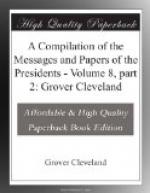But what gives a peculiar criminality to this invasion of Cuba is that, under the lead of Spanish subjects and with the aid of citizens of the United States, it had its origin with many in motives of cupidity. Money was advanced by individuals, probably in considerable amounts, to purchase Cuban bonds, as they have been called, issued by Lopez, sold, doubtless, at a very large discount, and for the payment of which the public lands and public property of Cuba, of whatever kind, and the fiscal resources of the people and government of that island, from whatever source to be derived, were pledged, as well as the good faith of the government expected to be established. All these means of payment, it is evident, were only to be obtained by a process of bloodshed, war, and revolution. None will deny that those who set on foot military expeditions against foreign states by means like these are far more culpable than the ignorant and the necessitous whom they induce to go forth as the ostensible parties in the proceeding. These originators of the invasion of Cuba seem to have determined with coolness and system upon an undertaking which should disgrace their country, violate its laws, and put to hazard the lives of ill-informed and deluded men. You will consider whether further legislation be necessary to prevent the perpetration of such offenses in future.
No individuals have a right to hazard the peace of the country or to violate its laws upon vague notions of altering or reforming governments in other states. This principle is not only reasonable in itself and in accordance with public law, but is ingrafted into the codes of other nations as well as our own. But while such are the sentiments of this Government, it may be added that every independent nation must be presumed to be able to defend its possessions against unauthorized individuals banded together to attack them. The Government of the United States at all times since its establishment has abstained and has sought to restrain the citizens of the country from entering into controversies between other powers, and to observe all the duties of neutrality. At an early period of the Government, in the Administration of Washington, several laws were passed for this purpose. The main provisions of these laws were reenacted by the act of April, 1818, by which, amongst other things, it was declared that—
If any person shall, within the territory or jurisdiction of the United States, begin, or set on foot, or provide or prepare the means for, any military expedition or enterprise to be carried on from thence against the territory or dominions of any foreign prince or state, or of any colony, district, or people, with whom the United States are at peace, every person so offending shall be deemed guilty of a high misdemeanor, and shall be fined not exceeding $3,000 and imprisoned not more than three years.
And this law has been executed and enforced to the full extent of the power of the Government from that day to this.




